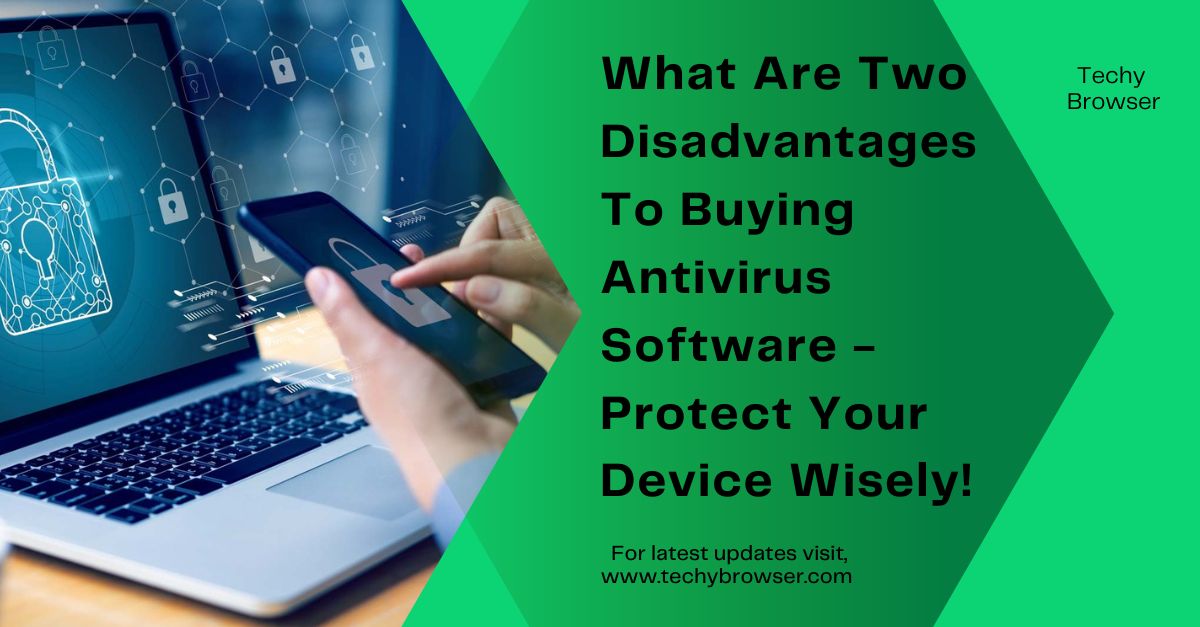In today’s digital world, cyber threats are everywhere. From viruses to ransomware, protecting your devices is crucial. Antivirus software is one of the most common ways people safeguard their computers and personal data. But is it always the best choice? While antivirus programs offer strong protection, they also have downsides.
One disadvantage of buying antivirus software is the high cost, as subscriptions require ongoing payments. Another drawback is system slowdowns, as antivirus programs consume resources, affecting performance. These issues make users question if paid protection is worth it.
In this article, we’ll explore what are two disadvantages to buying antivirus software and whether it’s worth the investment.
Understanding Antivirus Software!
1. What is Antivirus Software?
The purpose of antivirus software is to identify, stop, and eliminate malicious software from your computer.. It scans files, monitors online activity, and blocks malicious attacks.
2. How Does Antivirus Software Work?
Antivirus programs use virus definitions and behavioral analysis to identify threats. They run background scans, check downloaded files, and provide real-time protection. Some even offer extra security features like firewalls and password managers.
The Importance of Antivirus Software!
Antivirus software is important because cyberattacks are increasing every day. Hackers create new viruses, spyware, and phishing scams to steal personal data. Without antivirus software, devices can be at risk of identity theft, financial fraud, and system damage.

Antivirus software helps protect important files and keeps personal information safe. Many people use antivirus software to prevent hackers from accessing their bank details, passwords, and other sensitive data. Installing antivirus software is one of the best ways to stay safe online. Antivirus software scans files, detects harmful programs, and removes threats before they can cause damage. Keeping antivirus software updated ensures better protection against new threats.
Antivirus software helps block different types of cyber threats. It protects against viruses, which spread and damage files. Antivirus software also stops Trojans, which are harmful programs disguised as safe software. Another serious threat is ransomware, which locks files and demands payment to unlock them.
What Are Two Disadvantages to Buying Antivirus Software?
Despite its benefits, antivirus software isn’t perfect. Many users experience two major disadvantages:
1. High Cost and Recurring Payments:
Most premium antivirus software comes with a price tag. Many companies offer yearly subscriptions, and costs can add up over time. Some even require separate licenses for multiple devices. Hidden fees for additional features like VPNs and password managers make antivirus software even more expensive.
2. System Performance Issues:
Antivirus software runs in the background, constantly scanning files and monitoring activity. This consumes CPU power and RAM, slowing down your computer. Older devices suffer the most, making simple tasks like browsing or opening programs frustratingly slow.
Comparison of Antivirus Software Disadvantages!
The table below highlights the two main disadvantages of buying antivirus software, helping you make an informed decision.
| Disadvantage | Description | Impact on Users |
| High Cost | Paid antivirus requires a subscription, which can be expensive over time. | Users must pay annually or monthly, increasing long-term costs. |
| System Slowdowns | Antivirus software consumes system resources, affecting performance. | Slower device speed, lagging applications, and reduced efficiency. |
Consider these factors when choosing the right security solution for your device!
How to Choose the Right Antivirus Software?
When choosing the best antivirus programs, there are a few important things to consider. First, check the system performance—some antivirus programs can slow down your device, while others run smoothly in the background. Next, think about the cost. Some antivirus programs are expensive, while others offer affordable plans with no hidden fees. Finally, look at the features. Some of the best antivirus programs include extra tools like a VPN or firewall, which can provide more security. Before making a decision, it’s important to compare different options and choose the best antivirus programs that meet your needs.
There are several best antivirus programs available that offer strong protection. Norton 360 is one of the best antivirus programs, providing excellent security features. Bitdefender is another top choice among the best antivirus programs, known for its strong malware protection. McAfee is also a great option and is considered one of the best antivirus programs because of its additional security tools. If you want a free option, Windows Defender is one of the best antivirus programs that come built into Windows. No matter what you choose, using the best antivirus programs will help keep your device safe from threats.
Read: Ai Procurement Software – Transforming The Future Of Sourcing And Purchasing!
Detailed Analysis of Disadvantages!
1. How Expensive is Antivirus Software?
A good antivirus program can cost anywhere from $30 to $100 per year. Some offer multi-device plans, but those are even more expensive. Businesses often pay hundreds of dollars for corporate antivirus solutions.
2. Subscription Models and Hidden Fees:
Many antivirus companies use subscription models, meaning you must renew yearly. Some offer discounts for the first year but increase prices later. Features like parental controls or identity theft protection cost extra.
3. How Antivirus Affects System Speed:
Antivirus software runs background processes to scan files in real time. This consumes CPU and RAM, causing slowdowns. Large system scans can make computers almost unusable until they finish.
4. CPU and RAM Consumption:
Heavy antivirus programs consume a lot of system resources. Gamers and professionals using demanding applications often experience lag due to antivirus processes.
Comparison of Paid vs. Free Antivirus Software!
Free antivirus programs can give good protection for your computer. Many people use free antivirus programs because they help keep devices safe without any cost. Windows Defender is a good example of a free antivirus program that comes with built-in security features. Free antivirus programs can protect against many threats, but they may not have all the extra tools that paid versions offer.

If you are looking for basic security, free antivirus programs can be a good choice. Many users rely on free antivirus programs because they are easy to use and provide essential protection. Some free antivirus programs also get regular updates to keep your system safe. Using free antivirus programs can help prevent viruses and malware from harming your device. Many people trust free antivirus programs to keep their computers running smoothly. If you need simple protection, free antivirus programs can work well for you.
Paid versions of antivirus programs offer more advanced features than free antivirus programs. They may include tools like VPNs, firewalls, and identity theft protection, which free antivirus programs do not always provide. Some people prefer paid versions because they want extra security beyond what free antivirus programs offer.
Alternative Security Measures!
1. Built-in Security Features of Modern Operating Systems:
Windows and macOS now include built-in security tools like Windows Defender and XProtect. These offer strong protection without additional software.
2. Best Cybersecurity Practices:
- Keep your operating system updated
- Avoid downloading files from untrusted sources
- Use strong, unique passwords
- Enable two-factor authentication
- Be cautious with email attachments
Read: Ai Takeoff Software – Revolutionizing Construction Estimating!
FAQs:
1. Is buying antivirus software necessary?
Not always. Many free options offer strong protection.
2. What are some free alternatives to antivirus software?
Windows Defender, Avast Free, and AVG Free are good choices.
3. Can antivirus software slow down my PC significantly?
Yes, especially on older computers.
4. What is the best way to stay protected online?
Update your system, avoid suspicious downloads, and use strong passwords.
5. Do Mac and Linux users need antivirus software?
Macs have built-in protection, and Linux is less targeted by malware.
Conclusion:
While antivirus software protects against cyber threats, it also has downsides. What are two disadvantages to buying antivirus software? The high cost and system performance issues make people question whether it’s worth the investment. Free alternatives and built-in security features provide effective protection without the drawbacks.
Also Read:
- Best Ai Dj Software – The Ultimate Guide!
- Procurement Ai Software – Revolutionizing Supply Chain Management!
- Ai Governance Software – A Complete Guide For Businesses In 2025!
- Invesco Ai And Next Gen Software Etf – A Smart Investment In Ai And Technology Stocks!
- White Label Ai Software – The Future Of Ai-Powered Custom Solutions!










